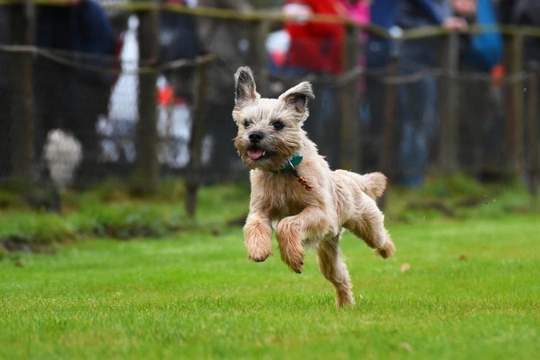
Border Terrier Training Guide: Tips & Tricks
Border Terriers have long been firm favourites whether in a working or home environment and for good reason. They are fun-loving, inquisitive and bold by nature being just as happy in a family environment as they are tracking a scent in the field. Like all terriers, the Border Terrier is intelligent, reliable and affectionate which are just some of the reasons why the breed has consistently remained a popular choice in the UK whether as a companion or family pet.
Exercise is a must
Keeping a Border Terrier happy involves lots of daily exercise combined with a ton of mental stimulation and training must start early so that these smart terriers understand what's expected of them. Border Terriers have a tremendous amount of energy and being so determined, it takes a lot to tire them out. The saying a "tired dog is a good dog" is never truer as when describing these charming, alert and feisty dogs.
Training must start early
Border Terriers have a natural instinct to work and are never happier than when they are given things to do. The key to successfully training them is to concentrate on their natural abilities rather than going against them. Border Terriers don't like lying around, they want to work and do something so it's a good idea to get them started as early as possible focusing on activities they really enjoy. Once a puppy is around 6 months old, their education can start in earnest, but before that they can be taught to find a toy, track down a treat and to respond to commands paying special attention to them coming back when called.
What about toilet training?
Border Terrier puppies are known to be hard to house train thanks to their stubborn streak. As such, it's important to remain consistent and to start a puppy's education right from the word go. There will be accidents, but it's essential to stay calm and not to get annoyed with a sensitive puppy which could end up making house training even more challenging.
The best way to go about training them to do their "business" outside or on a puppy pad, is to feed a puppy at the same time of the day which means getting to know their "toilet routine" and to gently encourage them to go outside or to their puppy pads when they need to "go". Puppies need to go to the toilet more frequently than mature dogs, so it's essential they be let out as often as possible. If they are using puppy pads, they must have access to clean pads at all times. It's also essential for a puppy to be praised and rewarded when they get it "right" and not to be told off when they get it "wrong".
Training a puppy to track a scent
Border Terriers love to track a scent and by turning it into a game, it tailors a training session to suit a dog’s natural skills. By hiding a favourite treat for a puppy to find, keeps a Border Terrier puppy entertained and focused. It also teaches them some of the first commands which they should be taught as early as possible which includes "find it".
Hiding a favourite treat in an "easy to find” place to begin with and then making it harder for a puppy to find as time goes by, makes it easy for a Border Terrier to find the treat to start off with, but more challenging as time goes. This can be achieved by hiding the treats further away and more unpredictable places. This stimulates a dog to use their brains and to problem solves which like all terriers, Border Terriers love to do.
Upping the ante
Once a Border Terrier gets good at finding a favourite treat, it's time to up the ante by using different commands to find other things. Giving a different command for each toy teaches a Border Terrier to recognise what they are being asked to track and find. It also makes the game a lot more interesting which goes a long way in keeping such an intelligent, quick-witted terrier focused while at the same time teaching them lots of new commands.
The all-important recall command
It can be hard to get a Border Terrier's attention once they've picked up a scent because their focus is on tracking it down. As such, getting a dog to listen when called can prove incredibly challenging even for people who are familiar with the breed.
A good tip is to find out what motivates a Border Terrier the most whether it's high value treats or clicker training. Whichever is the most effective at getting a dog's attention is the one to use when training a terrier to listen and more importantly, to pay attention to the "recall" command and come back when called even if they've picked up an interesting scent.
Without the right reward at the end of a command, a smart Border Terrier will look for their own "rewards" which is typically going off and tracking that irresistible scent they've just picked up all on their own by turning a deaf ear to an owner.
The rewards are well worth it
Training a Border Terrier can be challenging, but the effort is well worth it, bearing in mind that the best way to a dog's heart is to play with their natural instincts and scenting skills. Keeping to a routine right from the word go and throughout a dog’s life also helps a Border Terrier understand what is expected of them. The end result is a happy, fun-loving Border Terrier and a dog that’s well-behaved and well-trained dog no matter where they are.



